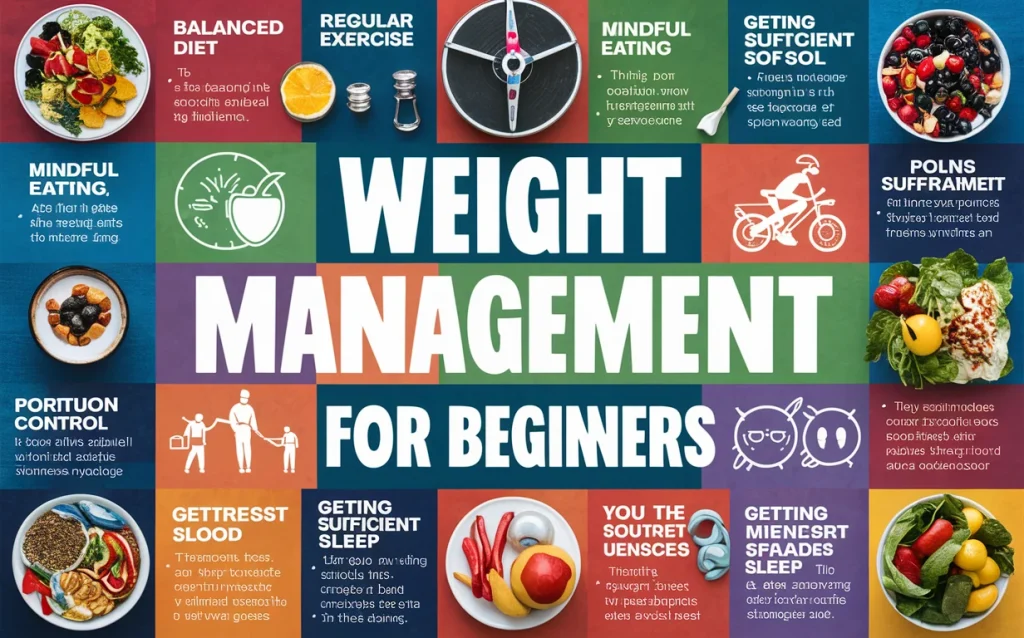Welcome to your comprehensive guide on weight management for beginners! Whether your goal is to lose weight, maintain a healthy weight, or simply improve your overall healthy lifestyle, this article will provide you with practical and actionable tips to kickstart your journey towards sustainable habits. By the end of this guide, you’ll have a clear understanding of the fundamentals of weight management and be empowered to implement long-term lifestyle changes that will help you achieve your desired results.
Key Takeaways
- Develop a solid understanding of the basics of weight management, including healthy weight, calorie balance, and factors affecting weight loss.
- Learn how to set realistic goals, track your progress, and create a personalized meal plan to support your weight management journey.
- Discover lifestyle changes, such as increasing physical activity and practicing mindful eating, that can lead to sustainable weight management results.
- Equip yourself with strategies to overcome common challenges, including cravings, emotional eating, and maintaining long-term motivation.
- Embrace a holistic approach to weight management that prioritizes your overall well-being and empowers you to achieve your health and fitness goals.
Understanding Weight Management Basics
Achieving and maintaining a healthy weight is crucial for overall well-being. In this section, we’ll explore the fundamental concepts of weight management, providing you with a solid foundation to make informed decisions and develop an effective plan tailored to your individual needs.
What is a Healthy Weight?
A healthy weight is determined by various factors, including your height, body composition, and overall health status. The Body Mass Index (BMI) is a commonly used metric to assess whether an individual is within a healthy weight range. However, it’s important to note that BMI is not a perfect measure, as it doesn’t account for factors like muscle mass and body fat distribution. Consulting with a healthcare professional can help you determine your optimal healthy weight range.
The Role of Calorie Balance
One of the key principles of weight management is the concept of calorie balance. To maintain a stable weight, the number of calories you consume must equal the number of calories your body burns through daily activities and metabolic processes. When you consume more calories than your body burns, the excess is stored as fat, leading to weight gain. Conversely, if you burn more calories than you consume, your body will tap into its fat stores, resulting in weight loss. Understanding this calorie balance is crucial for effectively managing your weight.
Factors Affecting Weight Loss
While the calorie balance is the foundation of weight management, various other factors can influence weight loss and overall weight management. These include your age, gender, genetics, lifestyle, stress levels, and underlying medical conditions. Factors like physical activity, sleep quality, and hormonal balance can also play a significant role in weight loss and maintenance. By recognizing these factors, you can develop a more comprehensive and personalized approach to your weight management journey.
| Factor | Impact on Weight Management |
|---|---|
| Age | Metabolism tends to slow down with age, making weight loss more challenging. |
| Gender | Men typically have a higher metabolic rate than women, which can influence weight loss and maintenance. |
| Genetics | Certain genetic factors can predispose individuals to weight gain or make weight loss more difficult. |
| Lifestyle | Factors like physical activity, sleep, and stress management can significantly impact weight management. |
| Medical Conditions | Underlying health issues, such as thyroid disorders or hormonal imbalances, can affect weight regulation. |
Weight Management Tips for Beginners
As you embark on your weight management journey, it’s crucial to establish a solid foundation for sustainable success. In this section, you’ll discover practical tips to help you set realistic goals, track your progress, and develop a personalized meal plan.
Set Realistic Goals
The first step towards effective weight management is to set realistic and achievable goals. Avoid overly ambitious targets that may lead to disappointment and frustration. Instead, focus on establishing small, incremental goals that you can consistently work towards. This will not only help you stay motivated but also ensure that your weight management efforts are sustainable in the long run.
Track Your Progress
Monitoring your progress is essential for staying on track and maintaining motivation. Utilize tools such as a fitness tracker, a weight management app, or a simple notebook to regularly record your weight, measurements, and other relevant data points. By tracking your progress, you’ll be able to identify patterns, celebrate your successes, and make adjustments to your plan as needed.
Develop a Meal Plan
Creating a well-structured meal plan can significantly support your weight management efforts. Take the time to plan your meals in advance, focusing on nutrient-dense, whole foods that align with your caloric and macronutrient needs. This approach will help you make informed food choices, avoid impulsive or unhealthy snacking, and maintain a sustainable weight management strategy.
Lifestyle Changes for Sustainable Results
Achieving lasting weight management success requires making sustainable lifestyle changes. This section will guide you through two essential components: increasing your physical activity and practicing mindful eating. By incorporating these principles into your daily routine, you’ll be well on your way to long-term weight management success.
Increase Physical Activity
Regular physical activity is a cornerstone of sustainable weight management. Aim to incorporate a variety of enjoyable activities, such as brisk walking, cycling, swimming, or strength training, into your weekly routine. Start small and gradually increase the duration and intensity of your workouts to build a sustainable habit. Remember, the key is to find physical activities that you genuinely enjoy, as this will make it easier to stick to your routine in the long run.
Practice Mindful Eating
Mindful eating is a powerful tool for sustainable weight management. This approach involves being fully present and attentive to your eating experience, rather than mindlessly consuming food. Take the time to savor each bite, pay attention to your hunger and fullness cues, and make conscious choices about what and how much you eat. By cultivating a mindful relationship with food, you can establish healthier eating habits that support your overall wellbeing.
| Tip for Sustainable Weight Management | Description |
|---|---|
| Increase Physical Activity | Incorporate a variety of enjoyable physical activities into your weekly routine, gradually increasing the duration and intensity to build a sustainable habit. |
| Practice Mindful Eating | Be fully present and attentive to your eating experience, paying attention to hunger and fullness cues, and making conscious choices about what and how much you eat. |
Overcoming Challenges and Plateaus
Weight management can be a rewarding yet challenging journey, and it’s natural to encounter obstacles along the way. In this section, you’ll discover strategies to help you navigate through common weight management challenges, such as cravings, emotional eating, and plateaus, as well as ways to boost your metabolism and stay motivated in the long run.
Dealing with Cravings and Emotional Eating
Cravings and emotional eating can be significant hurdles when it comes to weight management challenges. To overcome these, try implementing techniques like mindful eating, keeping a food diary, and finding healthy alternatives to your go-to comfort foods. Recognizing the emotional triggers that lead to unhealthy snacking can also help you develop coping mechanisms to manage emotional eating effectively.
Boosting Metabolism Naturally
Your metabolism plays a crucial role in weight management. While genetics and age can influence your metabolic rate, there are natural ways to give it a healthy boost. Incorporating regular exercise, including strength training, into your routine, staying hydrated, and consuming a balanced, nutrient-rich diet can all contribute to a more efficient metabolism.
Staying Motivated Long-Term
Maintaining motivation is key to sustaining your weight management efforts over the long haul. Set achievable milestones, celebrate your progress, and surround yourself with a supportive network. Engaging in activities you enjoy, such as physical hobbies or social gatherings, can also help you stay energized and committed to your health goals.
By addressing these common weight management challenges, you’ll be better equipped to overcome obstacles, maintain a healthy lifestyle, and achieve your long-term weight management objectives.
Conclusion
As you’ve learned throughout this comprehensive guide, the key to effective weight management lies in understanding the fundamental principles, adopting practical strategies, and implementing sustainable lifestyle changes. By setting realistic goals, tracking your progress, and developing a personalized meal plan, you’ve laid the groundwork for a successful weight management journey.
Embracing increased physical activity and practicing mindful eating are essential components for long-term success. Remember, the path to weight management is not a one-size-fits-all approach, but rather a personalized journey that requires patience, commitment, and a willingness to adapt to the unique challenges you may face.
Equipped with the tools and knowledge gained from this guide, you are now empowered to overcome obstacles, boost your metabolism naturally, and maintain your motivation for the long haul. Embrace these weight management strategies, and you’ll be well on your way to achieving your health and wellness goals, ultimately leading to a more sustainable lifestyle.
FAQ
What is a healthy weight?
A healthy weight is determined by factors such as your height, age, and body composition. It’s generally recommended to maintain a body mass index (BMI) within the healthy range, which is typically between 18.5 and 24.9.
How do I calculate my calorie balance?
To calculate your calorie balance, you need to determine your daily calorie needs based on your age, gender, activity level, and other factors. Then, compare the number of calories you consume through food and drinks to the number of calories your body burns. If you consume more calories than your body burns, you’re in a calorie surplus, which can lead to weight gain. Conversely, if you consume fewer calories than your body burns, you’re in a calorie deficit, which can lead to weight loss.
What factors can affect my weight loss?
Several factors can influence your weight loss, including your metabolism, genetics, age, sleep quality, stress levels, and any underlying health conditions. Additionally, factors such as your diet, physical activity, and lifestyle choices can significantly impact your weight management efforts.
How do I set realistic weight management goals?
When setting weight management goals, it’s important to make them specific, measurable, achievable, relevant, and time-bound (SMART). A realistic goal might be to lose 1-2 pounds per week or to maintain your current weight within a certain range. It’s also helpful to focus on non-scale victories, such as improved energy levels or better fitting clothes.
How can I effectively track my weight management progress?
Tracking your progress can be done in various ways, such as regularly weighing yourself, taking body measurements, or monitoring your clothing fit. Additionally, you can keep a food and activity journal to gain insights into your habits and identify areas for improvement. Regular check-ins and adjustments to your plan can help you stay on track and achieve your goals.
What are the key components of a balanced meal plan for weight management?
A balanced meal plan for weight management should include a combination of lean proteins, complex carbohydrates, healthy fats, and a variety of nutrient-dense fruits and vegetables. It’s essential to create a plan that provides adequate calories and nutrients to support your body’s needs while promoting a sustainable calorie deficit for weight loss.
How can I increase my physical activity for weight management?
Incorporating regular physical activity into your routine is crucial for weight management. This can include a combination of aerobic exercise, strength training, and flexibility/mobility exercises. Start with activities you enjoy, such as walking, swimming, or cycling, and gradually increase the duration and intensity as you build endurance and confidence.
What is mindful eating, and how can it support my weight management efforts?
Mindful eating involves being fully present and attentive to the experience of eating. This includes being aware of your hunger and fullness cues, savoring the flavors and textures of your food, and avoiding distractions during meals. Practicing mindful eating can help you make more conscious choices, prevent overeating, and develop a healthier relationship with food.
How can I deal with cravings and emotional eating?
Cravings and emotional eating can be challenging to manage, but there are strategies you can use to overcome them. These include identifying your triggers, finding healthy alternatives to satisfy your cravings, practicing stress management techniques, and seeking support from friends, family, or a professional if needed.
What are some natural ways to boost my metabolism?
There are several natural ways to help boost your metabolism, such as increasing your muscle mass through strength training, staying hydrated, getting enough sleep, and incorporating high-intensity interval training (HIIT) into your workout routine. Additionally, consuming foods that are high in protein, fiber, and certain vitamins and minerals can support a healthy metabolism.
How can I stay motivated for long-term weight management success?
Maintaining motivation for long-term weight management can be challenging, but there are strategies you can use to stay on track. These include setting small, achievable goals, celebrating non-scale victories, finding accountability partners or support groups, and continually adapting your plan to keep it fresh and engaging.











